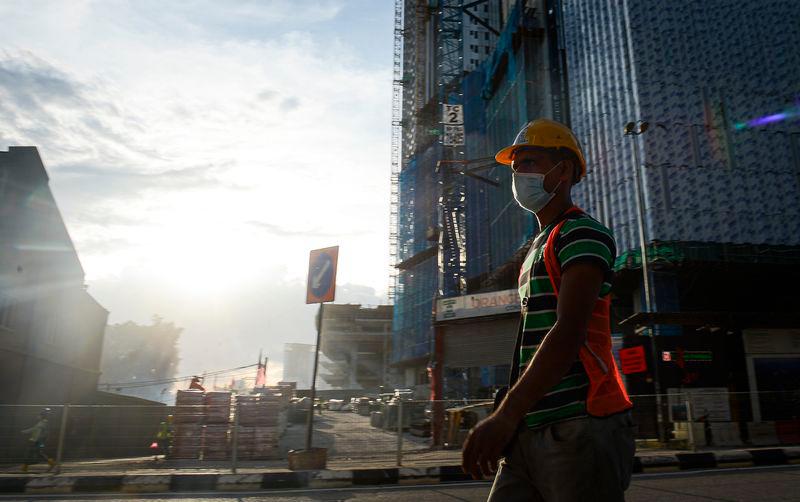Prior to January 2023, we had Section 60L in our Employment Act, which prevented discrimination based on whether one is a LOCAL worker or a FOREIGN worker - but sadly this provision was deleted vide EMPLOYMENT (AMENDMENT) ACT 2022 that came into force on 1/1/2023.
60L. Director General may inquire into complaint.(Employment Act 1955)(1) The Director General may inquire into any complaint from a local employee that he is being discriminated against in relation to a foreign employee, or from a foreign employee that he is being discriminated against in relation to a local employee, by his employer in respect of the terms and conditions of his employment; and the Director General may issue to the employer such directives as may be necessary or expedient to resolve the matter.
This was an VERY IMPORTANT provision against DISCRIMINATION at the workplace - which clearly stated that a FOREIGN employee had the right to lodge a complaint that he is being discriminated against in relation to a local employee, by his employer in respect of the terms and conditions of his employment. Likewise, the LOCAL employee also had the same right.
EMPLOYMENT (AMENDMENT) ACT 2022, however, introduced a NEW Section 69F to deal with Discrimination in Employment -
69F. Discrimination in employment
(1) The Director General may inquire into and decide any dispute between an employee and his employer in respect of any matter relating to discrimination in employment, and the Director General may, pursuant to such decision, make an order.
(2) An employer who fails to comply with any order of the Director General issued under subsection (1) commits an offence and shall, on conviction, be liable to a fine not exceeding fifty thousand ringgit; and shall also, in the case of a continuing offence, be liable to a daily fine not exceeding one thousand ringgit for each day the offence continues after conviction.".
Thus, reasonably the discrimination under the previous Section 60L is now covered by the NEW section 69F.
The weakness is that it now does not make clear that no worker/employee can be discriminated on the basis that he is FOREIGN employee in comparison to treatment of a LOCAL employee, or VICE VERSA.
BUT, with regard to FOREIGN Employee(or Migrant Worker), the problem of ACCESS to justice remains, as to claim rights violated, the employee is required to lodge their complaint at the Human Resource Department(Labour Department) or with regard wrongful dismissal at the Industrial Relations Department) - both in Malaysia. When these Departments fixes the next appointment for this rights violation proceedings, the employee is required to attend - and a failure to attend can result in an end of the claim.
For migrant workers, they may already have been 'forced out' of Malaysia - and hence, their access to justice comes to an end.
Now, at the Labour Department - if attempts of conciliation fails - the case proceeds to the Labour Court for trial.
Now, at the Industrial Relations Department - if attempts of conciliation fails - the case proceeds to the Industrial Court for trial.
Malaysia, unfortunately, to date still does not have provisions in law that ALLOWS the migrant worker to remain in Malaysia legally until their claims of rights violations are determined by the relevant Departments, and/or courts - which means it is extremely difficult for MIGRANT WORKERS to get justice.
In Hong Kong, the State used to provide board and lodging for migrant workers until their cases are determined. And naturally, the progress of these cases are EXPEDITED and will end very fast.
In Malaysia, a Migrant Worker can apply for a 1-Month Special Pass(at RM100 for each application) - which will be very expensive as their cases can go on for years at time.
Staying legally is one issue - but the bigger issue is that they do not have the right to work and earn while they stay in Malaysia fighting for justice. Without the ability to work and earn is a major issue for a low wage worker fighting for justice in Malaysia
Hence, the INJUSTICE - and these migrant workers become and remains victims of HUMAN TRAFFICKING - exploited with no access to justice in Malaysia - facilitated by Malaysian laws, policies and practices.
Malaysia uses a lot of MIGRANT workers - 3.4 million documented migrant workers in a country with a population of 3.4 million, and the number of Malaysians being 30.6 million in the 1st quarter of 2024.
MALAYSIA kini mempunyai jumlah pekerja asing antara yang tertinggi pernah dicatatkan iaitu 3.4 juta atau 10 peratus daripada 34 juta penduduk. Jumlah rakyat Malaysia setakat suku pertama 2024 ialah 30.6 juta.
For Malaysian WORKERS too, there is a problem with access to justice for workers. Attending Labour Department and/or IRD sessions/meetings is difficult - as the worker needs to take their Annual Leave from their new place of work - Should there not be an entitlement to Administration of Justice leave, for workers to attend meetings and court for the purposes of pursuing justice against usually previous employers - sometimes current employers still?
Many employers pay migrant workers MINIMUM WAGES - whereby such low wages will not attract Local Malaysian Workers.
Bank Negara proposed a MINIMUM WAGE of RM2,700 - which may attract LOCAL workers, and really there should be a HIGHER Minimum Wage for them 3D Jobs as it is harder, and higher wages will attract local workers.
UNICEF opines it should be bumped up to RM2,102 monthly, which is more in line with RM2,700 living wage proposed by Bank Negara Malaysia.
Is PM Anwar Ibrahim still using 'cheap labour' to attract foreign investments - end INJUSTICE on all workers, including Malaysian workers - increase MINIMUM WAGE to RM2,700 (listen to Bank Negara) - and get LOCAL WORKERS back to work.
When a foreign company is set up in Malaysia - but the workers are all FOREIGN Workers - the money flows OUT, but if the workers are Malaysian, then the money stays in Malaysia ...
As the cost of living rises, and the value of the Ringgit drops - Malaysia may have more and more difficulty attracting foreign workers. HELLO, we are a 'poor' nation with about RM1.5 Trillion plus debt, so we must stop behaving like we are "RICH"...
Can Malaysia survive WITHOUT Migrant Workers? That is a CONCERN
Malaysia sudah terlebih pekerja asing

MALAYSIA kini mempunyai jumlah pekerja asing antara yang tertinggi pernah dicatatkan iaitu 3.4 juta atau 10 peratus daripada 34 juta penduduk. Jumlah rakyat Malaysia setakat suku pertama 2024 ialah 30.6 juta.
Berdasarkan laporan Perangkaan Demografi oleh Jabatan Perangkaan Malaysia itu, berlaku pertambahan sebanyak 600,000 warga asing hanya dalam tempoh setahun.
Pada suku pertama 2022 terdapat 2.4 juta warga asing manakala pada 2023 sebanyak 2.8 juta.
Ketika jumlah pekerja asing sekitar 2.8 juta tahun lalu, Timbalan Menteri Sumber Manusia, Mustapha Sakmud memberitahu Dewan Rakyat bahawa sudah berlaku lambakan pekerja asing dalam negara, melebihi unjuran yang ditetapkan.
Menurut beliau, mengikut unjuran Kementerian Ekonomi, angka pekerja asing yang sepatutnya berada di Malaysia adalah 2.4 juta sahaja atau 15 peratus daripada jumlah keseluruhan tenaga kerja seramai 16.51 juta.
Jika unjuran itu boleh dijadikan sandaran, bermakna kita sebenarnya telah terlebih sejuta pekerja asing.
Bagaimanapun tentulah ada pertimbangan lain dalam peningkatan mendadak tersebut seperti keperluan tenaga kerja dalam sektor yang kurang diminati rakyat tempatan seperti perladangan dan pembinaan.
Namun harus diingat, 3.4 juta tersebut adalah pekerja yang sah. Kalau dikira sekali dengan pendatang asing tanpa izin (PATI) jumlahnya mungkin naik sekali ganda.
Pertubuhan Antarabangsa untuk Migrasi (IOM) misalnya menganggarkan terdapat antara 1.2 juta hingga 3.5 juta pekerja PATI di Malaysia pada 2022.
Kalau jumlah PATI digabungkan dengan pekerja asing yang sah sekarang, ia boleh mencecah angka sebesar 6.9 juta orang!
Tidak dinafikan ada banyak negara lain yang lebih bergantung kepada pekerja asing.
Arab Saudi contohnya mempunyai 13.4 juta warga asing iaitu 42 peratus daripada 32.2 juta populasi negara itu.
Namun dengan jumlah pengangguran sebanyak 566,600 orang pada Mac 2024 dan pelbagai masalah sosial yang dicetuskan mereka, kerajaan tidak boleh membiarkan lambakan warga asing di negara ini.
Apatah lagi dengan
pelbagai pelaburan baharu syarikat antarabangsa seperti Microsoft dan
Google di Malaysia, pekerja asing dikhuatiri akan menguasai ratusan ribu
lagi peluang pekerjaan dalam bidang teknologi maklumat sekali gus
menyempitkan peluang rakyat tempatan. - Sinar Harian, 16/5/2024
Need for migrants remains significant as locals do not have necessary experience in various sectors especially in plantations, says employers association
PETALING JAYA: The country should recruit more foreign workers to fill the labour shortage in construction, manufacturing, and especially the plantations sector where locals are reluctant to work, said Malaysian Employers Federation (MEF) President Datuk Dr Syed Hussain Syed Husman.
“Malaysians do not have the necessary experience in the plantation sector compared with Indonesians. While efforts have been made to reduce our dependency on foreign workers through automation processes, the need for them in the plantation sector remains significant.”
Syed Hussain said employers need to offer higher salaries to attract equally capable Malaysian workers for the various sectors, but this would undermine the cost competitiveness that is crucial to remain competitive against emerging economies in the region.
He added that long-term solutions to overcome hiring foreign workers include investing in research and development in agriculture technology to enhance efficiency.
He said the MEF has been collaborating with the International Organisation for Migration (IOM) and the International Labour Organisation Global Business Network on Forced Labour (ILO GBNFL) to educate its members on the procedures for hiring foreign workers.
“In 2023, we collaborated with SMEs and the IOM to conduct a capacity-building workshop on fair and ethical recruitment and employment of foreign workers, which provided participants with the tools to strengthen their policies and practices.
“We also collaborated with ILO GBNFL in launching a due diligence toolkit for fair recruitment of foreign workers to help companies, particularly SMEs, to set out a due diligence process when hiring workers from abroad.”
The Home Ministry reported that as of February, Malaysia has 2.12 million registered foreign workers who originate from Bangladesh, Indonesia, Nepal, Myanmar and India, among others.
Syed Hussain said if foreign workers are found medically unfit under the Foreign Workers’ Medical Examination Monitoring Agency, they will have to be returned to the source country, which will delay the recruitment process.
“A 2019 report by the Khazanah Research Institute said foreign workers do not directly impact employment opportunities and wages of Malaysians because they generally fill different roles within the economy.
“Foreign workers typically occupy unskilled positions, while Malaysians predominantly hold semi-skilled and skilled jobs.”
He said for legal purposes, smaller companies usually hire recruitment agents to assist in handling issues related to employing foreign workers, and that the MEF strongly advocates that companies carry out their due diligence to ensure there is no forced labour during the hiring process.
To ensure security, an initial step companies must take when hiring foreign workers is to conduct thorough screenings of prospective employees in their source country, he added.
“Candidates should be evaluated for suitable skills based on the positions being offered, their health status, and any indication of criminal or harmful behaviour.”
He said to protect Malaysians and foreign workers from misunderstandings and negative interactions, companies must provide comprehensive cultural training to help them understand Malaysia’s social norms, legal expectations, and workplace etiquette.
“This also includes local customs and traditions, offering practical guidance on daily interactions, and ongoing support through mentorship programmes. Such an approach will enhance the well-being and productivity of foreign workers, and foster a more harmonious working environment.”
Negative interactions between foreign workers and
local communities can be reduced by ensuring that their accommodation
and transport do not excessively impact any specific local areas, he
added. - SUN, 29/7/.2024
PETALING JAYA: The United Nations Children’s Fund (UNICEF)’s recent report, ‘The Living on the Edge Key Findings’ has revealed that the current minimum wage of RM1,500 is “too low and insufficient for the workers”.
UNICEF opines it should be bumped up to RM2,102 monthly, which is more in line with RM2,700 living wage proposed by Bank Negara Malaysia.
According to the report, the calculation takes into consideration key factors such as cost of living, poverty line income, median wage, and productivity.
READ MORE: Malaysia ranks 59th out of 67 countries for minimum wage
Along with a higher minimum wage, UNICEF advocates for universal childcare allowance and universal allowance for PWDs (person with disabilities).
They are suggesting a universal childcare allowance of RM200 per month for moms-to-be until their kids turn two and a universal for all PWDs and their caregivers.
UNICEF also advocates that all workers in Malaysia should have coverage from the Employees Provident Fund (EPF) and the Social Security Organisation (PERKESO), no matter what job they have.
This would ensure their protection against injury, unemployment and inadequate or no income during old age. - Sun, 9/5/2024
Adjustments must be balanced between workers being able to afford necessities and business survival: Expert
PETALING JAYA: The current minimum wage in Malaysia does not align with the rising cost of food and is not a living wage that prevents the lower income groups from falling below the poverty line as it does not keep pace with inflation and increases in the cost of living, said Academy of Sciences Malaysia fellow Datuk Dr Madeline Berma.
She was commenting on a minimum wage study involving 67 countries by e-commerce company Picodi Malaysia, which revealed that Malaysia ranked 59th.
The study showed the net minimum wage in Malaysia remained constant at RM1,323, with basic groceries alone costing about RM437.58 (33.1%) of the amount, reflecting an increase from 30.6% in 2023.
Berma said many employees working full-time and earning minimum wage faced difficulty paying for food, housing, transportation, childcare and healthcare.
Meanwhile, Bank Muamalat Malaysia Berhad chief economist Dr Mohd Afzanizam Abdul Rashid said adjusting the minimum wage requires a multifaceted approach.
“There needs to be a balance between ensuring employees can afford to pay for their living costs amid rising expenses, and simultaneously making sure businesses can manage their overhead costs and payroll.
“The adjustments should be made at predefined intervals to allow businesses to plan. This approach was formalised with the establishment of the National Wages Consultative Council Act 2011.”
Mohd Afzanizam said necessities accounted for 29.5% of the total Consumer Price Index (CPI) and is the largest share within the CPI basket.
“Thus far, prices within this category increased at a rate of 4.8% in 2023, slightly lower than the 5.7% recorded in 2022, which means the CPI basket is an important driver of general inflation.
“The anticipated increase in the prices of necessities implies that the purchasing power among Malaysians will be eroded, and individuals within the minimum wage bracket will experience the impact as their net income is reduced.”
Universiti Putra Malaysia Putra Business School economist Assoc Prof Dr Ida Md Yasin said the minimum wage is influenced by the principles of supply and demand within the labour force.
“When labour supply decreases, wages will rise. The minimum wage is already high in sectors such as oil and gas, while it remains low in less-skilled occupations like the food and beverage sector.
“But the manufacturing industry seems complacent and shows a preference for employing foreign workers over investing in machinery and automation due to cost savings.”
Ida said increasing the minimum wage might also cause industries to struggle with payroll issues, which could potentially result in higher unemployment rates.
However, she said salary levels do not always align with the educational qualifications of certain individuals since many industries prioritise experience in deciding higher compensation.
“While providing numerous employment opportunities, the government must concurrently prioritise the development of a skilled workforce.
“Its intervention is vital to prevent unfair industry practices, but the sectors have different pay structures. Individuals seeking a job must navigate the market carefully.”
Ida encouraged individuals to diversify their job prospects and evaluate if their skills could be transferred to other sectors.
“This includes considering options to earn more, such as through a side business or engaging in the gig sector. These are choices that are increasingly favoured today.
“Individuals should also actively
pursue alternative opportunities and steer clear of relying excessively
on the government,” she said. - Sun, 5/2/2024













No comments:
Post a Comment